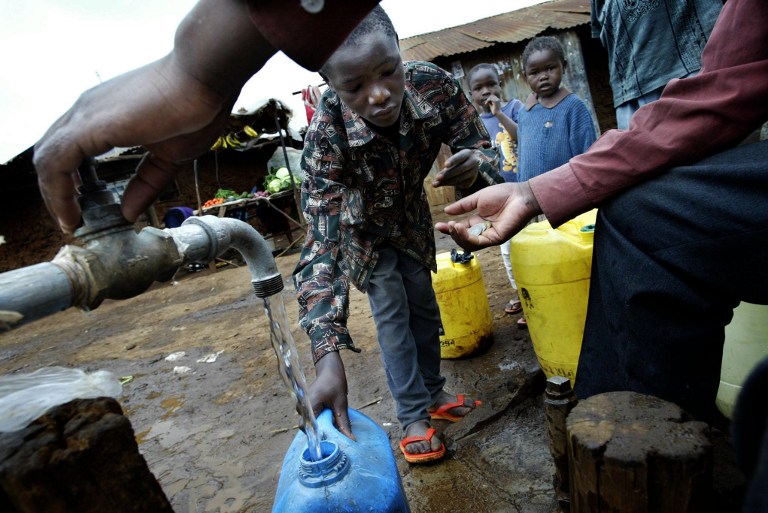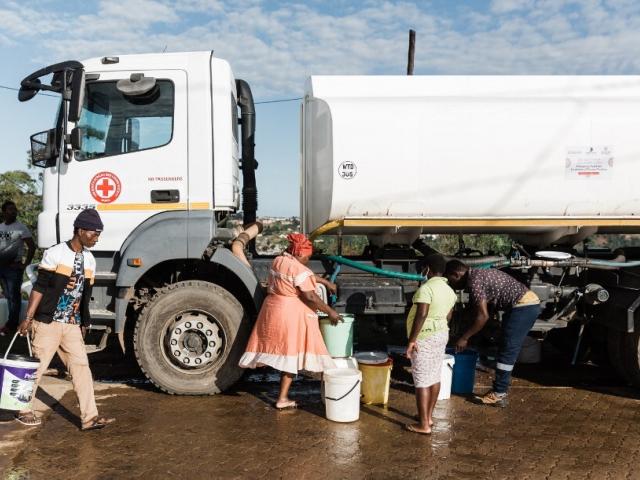This article is more than 8 years old
Is drinking tap water in Africa “risky business”?
An infographic published on the UK’s Mail Online claimed this, saying that tap water in every African country is “unsafe for human consumption”.
Africans were quick to jump to the continent’s defence, including the Africa Check team based in South Africa. Many branded the claim a generalisation and said that they drank African tap water daily without any ill effects.
“I drink ‘African tap water’ everyday and I'm healthy as a horse,” tweeted a user called Sandrine.
Is the claim true? And how was this conclusion reached? We looked into it.
Infographic not based on water quality tests

The infographic, originally published by budget airline website Just the Flight, used “information taken from the United States Centers for Disease Control and Prevention (CDC)”.
The CDC’s media relations representative, Christine Pearson, told Africa Check that the infographic was likely based on a cell phone app they had produced called “Can I eat this?” The app, Pearson said, “gives recommendations on food and water safety while traveling globally”.
Pearson said that the CDC does not test tap water globally. “The water part of the app was based on the [United Nations Human] Development Index data,” she said.
This UN index is a measure of human development on a scale of 0 to 1. This closer the score gets to 1, the higher the level of human development.
The CDC used 0.85 as a cut-off point, meaning that only 31 out of 187 countries were considered to have safe tap water. Pearson did not respond to questions regarding why that cut-off point as chosen as an indicator of water quality.
In contrast, the United States of America’s department of state advises American tourists that “food and water are generally safe” in South Africa, for instance.
‘Very crude’ way to measure tap water safety
Experts told Africa Check the index was not suitable to determine the quality of tap water. Director of the Stockholm International Water Institute’s Africa regional centre, Anton Earle, told Africa Check the cut-off point appeared arbitrary.
Water resource management scientist Anthony Turton said the use of the index as an indicator of water safety was “very crude”. He added: “If it were true then there would be millions of people sick, which is not the case.”
Senior advisor for Water, Sanitation and Hygiene at UNICEF, Andrew Trevett, told Africa Check that if the cut-off point were accurate then “countries such as Portugal, Poland and Hungary, all of which are in the European Union with stringent water safety regulations, would be categorised as not having safe drinking water”.
African data is ‘sparse and rather outdated’
Tracking down reliable, comparable data on water quality in Africa is difficult. “Data from Africa is currently very sparse and rather outdated,” said Philipp Saile, coordinator of the United Nations Global Environment Monitoring System and Water Data Centre in Germany.
The Switzerland-based Rural Water Supply Network’s Sean Furey said that piped water access in Africa had barely increased in recent decades and that new points of access “do have water quality problems – the biggest of which is the lack of water quality data”.
The United Nation’s Saile directed Africa Check to nationally-representative World Health Organisation (WHO) studies conducted between 2004 and 2005 in Ethiopia and Nigeria.
In Ethiopia, out of 832 piped water samples 80.4% met the WHO’s guideline standards for micro-organisms, faecal streptococci, arsenic, fluoride and nitrate levels.
The same study conducted in Nigeria, found that 77% of 630 piped water samples met the WHO’s standards. Borehole water levels were actually found to have higher levels of compliance at 86%.
However, this survey could have underestimated the extent of piped water contamination. A 2012 article published in the International Journal of Environmental Research and Public Health suggested that “one round of water quality testing is unlikely to capture the true extent of microbial contamination that might occur over a long period of time at a given source.”
More than 98% of SA tap water is safe
The quality and safety of tap water within countries can also vary greatly. Earle told Africa Check that “there are usually big differences between various parts of countries – strong rural-urban divides exist”.
“To lump together an entire country as equal risk seems extreme,” said Bartram. He explained that there are “huge sub-national differences” in the quality of tap water within countries.
This is evident in South Africa. In 2012, while 98.3% of municipalities complied with water safety standards - according to the government’s Blue Drop certification system - the department of water and sanitation warned residents of Umsombomvu Local Municipality in the Northern Cape and Nketoane Local Municipality in the Free State, amongst others, not to consume tap water without home disinfection treatment.
Conclusion: Not all tap water in Africa is ‘unsafe for human consumption’
The UK Mail Online’s claim that all tap water in Africa is “unsafe for human consumption” is false. Studies in Nigeria and Ethiopia, although dated, found that over 70% of piped water samples met international guidelines. In South Africa, over 98% of assessed municipalities meet the country’s water standards.
The claim, like many about the continent, is a sweeping generalisation that ignores the differences both between and within countries. However, Bartram notes that “as advice to a traveller, and especially a risk averse traveller, it may nevertheless be appropriate”.
Edited by Anim van Wyk
Additional reading
Claim that 94% in SA have access to safe drinking water…doesn’t hold water
Zuma’s claim that SA is one of only 12 countries with safe tap water is untrue



Add new comment